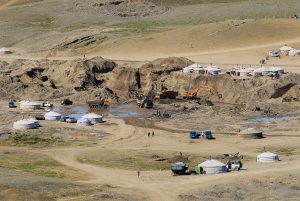Once a satellite in the Soviet orbit, Mongolia now pulsates with the entrepreneurial spirit of a dynamic democracy. Its transition from a centralized economy – once synonymous with nomadic animal husbandry – to one tapping into its abundant mineral reserves is nothing short of dramatic. This evolution is most evident in the capital, where the rhythms of pastoral life blend with the cadence of modern commerce.
In a country where the population barely tips over 3 million, Mongolia’s economic resurgence is significantly fueled by its formidable reserves of mineral wealth. Possessing the world’s second-largest reserves of copper and substantial quantities of rare earth elements, Mongolia is a global vault of critical minerals that are becoming increasingly indispensable in electronics, renewable energy technologies, and defense infrastructure. Boasting a literacy rate that surpasses 98 percent, Mongolia’s workforce is both educated and eager, poised to propel the nation forward.
Strategically ensconced between the economic behemoths of China and Russia, Mongolia’s critical mineral riches are not just a national treasure but a cornerstone of global supply chains.
Amid these dynamic cultural transformations and burgeoning mineral wealth, Mongolia has strategically implemented its “third neighbor policy.” The policy represents a deliberate strategy to shift diplomatic and economic ties beyond its powerful neighbors, Russia and China, by forging alliances with democratic nations across the globe. The recent influx of high-level political visitors from the United Kingdom, France, the United States, and the Pope suggests the strategy is working.
However, it is clear that the economic stakes, dependent on the management of its abundant mineral wealth, and continued diplomatic success are both underpinned by the need for ongoing commitments to democratic principles and good governance.
Recent corruption scandals have cast shadows over Mongolia’s progress, threatening the trust and integrity of its institutions. According to Transparency International’s Corruption Perceptions Index, Mongolia ranks 121st out of 180 countries, indicating a pressing need for reform. Its score of 33 (100 being very transparent) – well below the Asia-Pacific regional average of 45 – underscores the urgent need for Mongolia to bolster its anti-corruption measures to safeguard its potential developmental gains from mineral wealth.
In an illustrative example, revived allegations by the U.S. Department of Justice against former Prime Minister Batbold Sukhbaatar have accused him of funneling millions from mining contracts into his lavish lifestyle through a complex network of shell companies. These allegations resurfaced at a time when Mongolia is not only heading into parliamentary elections but also contending with a devastating year of “Dzud” – a severe winter drought that has killed 2.1 million animals and nine people, affecting countless Mongolian families and their livestock.
The DOJ investigations alleged that a company associated with Batbold, Catrison, an entity he owned through trusted intermediaries, was peculiarly awarded a $68 million contract in the mining sector, despite an obvious lack of any mining expertise. Allegedly, the funds were navigated through a web of shell companies, ultimately financing luxury apartments in New York City.
This corruption scandal followed last year’s coal trade corruption scandal with China, which siphoned off billions from the Mongolian economy through alleged fraud across the mineral value chain, specifically by the midstream traders and transporters. Corrupt dealers undervalued off-take agreements and overvalued possibly illicit transport. These events led to three weeks of political protests, global attention, and the government declaring the “Year to Fight Corruption.”
In response, Mongolia has beefed up its anti-corruption measures and revamped its criminal laws, signaling a robust commitment to cleanse its institutions and restore public trust. Mongolia has harnessed the international community and accepted technical assistance, implementing capacity building activities and collaborative governance practices reflecting the collective efforts essential to combat corruption and foster enduring, sustainable growth.
I have been engaged in Mongolia for nearly a generation. Since my first journey across the country in 2001, I have witnessed the mines dramatically grow and impact many cornerstones of Mongolian life. The minerals economy is intricate and highly competitive, involving massive long-term financial commitments that hinge on strong relationships and trust.
For Mongolia, securing the right approach is not just a choice but essential for safeguarding its sovereignty, culture, and democratic values. The efforts Mongolia makes now to fortify its “third neighbor policy” are crucial for diversifying markets while maintaining stability and attracting investment. However, to achieve this, anti-corruption measures and good governance must remain at the forefront of government and business agendas.
Further engagement in innovative programs like the United States program to Galvanize the Private Sector as partners to combat corruption, serve as a unique opportunity to reinvigorate commitments to international standards, like the EITI. By strengthening Beneficial Ownership processes, Mongolia can make significant strides in achieving key government policy priorities. These include cultivating a digital economy, enhancing the integrity of the business environment, and combating illicit financial flows. This will not only bolster economic growth but also reinforce trust and transparency within the market.
All these efforts can intensify actions to pinpoint and mitigate corruption risks across the minerals value chain, enhancing environmental and social protections, and bolstering transparency around contracts, tax payments, commodity trades, and company ownership.
As Mongolia navigates these turbulent waters, the support of the international community becomes indispensable. More than mere observers, global partners are crucial in working with Mongolia to strengthen its governance frameworks. Standing at a critical crossroads, Mongolia must balance its commitment to democratic principles with the intricate demands of international diplomacy and essential internal reforms. The decisions made during this period will not only shape Mongolia’s future but will also define its role in a global economy increasingly dependent on its vast, yet vulnerable, natural resources.

































